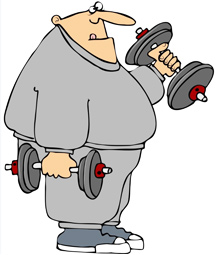
Get it Right!
Warped values and skewed stringencies led to the destruction of both temples, where human life was less important than turning over the sacrificial meat and bones on the altar...

It was midnight, so I thought that the gym on the ground floor of the hotel where we were staying would be empty; fortunately, I was right. After a warmup, I began to do a total-body weight routine that includes three sets of eight different exercises. Half way through my routine, a tremendous young man in his late twenties walks in, accompanied by a lady friend. The dude was about 6’2”, weighing some 285 pounds and wearing a muscle-shirt that not only showed off his tremendous biceps, but accented his protruding belly and awful round-shouldered posture as well.
I tried to ignore him, but he was being very demonstrative about picking up much more weight than he should have, lifting, and then letting the barbell crash to the mat like the body-building champs do in the movies. The guy was doing a military press, yelling like Tarzan or King Kong; rather than keeping an upright form, his shoulders were swaying way back and he was putting a dangerous amount of pressure on his lumbar spine. Form is so important in weight training, for any qualified trainer will tell you that bad form not only causes injuries but is more harmful to the body than beneficial.
Fitness trainers have an expression: “Get it right!” Any exercise, from simple breathing to the most complex routine, must be done in the best possible form to insure optimal performance, gain and benefit  to the body. Doing less repetitions and picking up less weight might make a weaker impression on onlookers who don’t know anything about proper form, but together with proper form, with they are ever so much more conducive to good health, good fitness, upright posture and future gain. Indeed, the harder one challenges the body, the more critical good form becomes. That’s why trainers yell their war cry, “Get it right!”, anytime they see someone doing an exercise in bad form.
to the body. Doing less repetitions and picking up less weight might make a weaker impression on onlookers who don’t know anything about proper form, but together with proper form, with they are ever so much more conducive to good health, good fitness, upright posture and future gain. Indeed, the harder one challenges the body, the more critical good form becomes. That’s why trainers yell their war cry, “Get it right!”, anytime they see someone doing an exercise in bad form.
I asked myself, “What was Hashem showing me with the big dude and the bad form?” Rather than doing what the exercise called for properly, he was lifting too much weight, doing things that he shouldn’t have. Then it hit me…
How many times do we have basic laws that we’re supposed to follow in Halacha, yet we take upon ourselves all types of stringencies – frumkeiten – and in the end, do more damage to ourselves than good. Such stringencies even led to the destruction of both our Holy Temples. Sounds strange?
The Gemara in tractate Yoma tells a hair-raising story. Two Cohanim – priests – were racing up the plank of the altar; the one who reached the altar first would win the privilege of performing the trumat hadeshen, a prestigious rite that needed to be done at that time. When one of the Cohanim saw that his peer was about to overtake him and win the race, he took out a knife and stabbed him. The honor of performing the holy rite was more important to the priest than his peer’s life. In his warped view – which was shared by many of his peers – human life was less important than turning over the sacrificial meat and bones so that they would burn properly on the altar. In fact, the Gemara says that when the father of the mortally wounded Cohen found that his son was still alive, convulsing in his final struggle with death, the other Cohanim let out a sigh of relief, happy that the first Cohen’s knife was not rendered ritually impure. The Gemara says that they cared more about the ritual purity of utensils than they did about bloodshed.
The Cohanim back then should have had a coach yelling at them, “Get it right! Do you think Hashem wants your positive mitzva by transgressing one of the Torah’s three most serious negative mitzvot! No way!” This type of warped values and skewed stringencies led to the destruction of both temples. In the First Temple, people were ultra-stringent about ritual purity, yet they had no problem murdering Zechariah the Prophet right there inside the Holy Temple. Respect of fellow man was even worse in the Second Temple.
When will we ever get it right? Until we do, we’ll simply have another round of the Three Weeks with its fasts and stern judgments.
Hashem doesn’t want stringencies. He wants us to do the basics as prescribed in the Shulchan Oruch, the Code of Jewish Law. When we don’t maintain proper Halachic “form”, we end up being stringent where we should have been lenient and lenient where we should have been stringent. You know what that means?
If we want Mashiach, the full redemption of our people with the in-gathering of the exiles and the rebuilding of our Holy Temple in Jerusalem, we have to get it right!












7/02/2015
honor your parents vs. making aliyah
Today many people want to move to Eretz Yisrael yet have elderly parents in chutz la'aretz. The parents may have some support systems but it really should be the children taking care of them. How do we decide what to do? The mitzvah to honor your parents is GIANT. Yet we feel a very strong drive to move to Israel. What can we do? We need Moshiach now.
7/02/2015
Today many people want to move to Eretz Yisrael yet have elderly parents in chutz la'aretz. The parents may have some support systems but it really should be the children taking care of them. How do we decide what to do? The mitzvah to honor your parents is GIANT. Yet we feel a very strong drive to move to Israel. What can we do? We need Moshiach now.
6/29/2015
the right track
That's why we need to choose our rabbi carefully, who will guide us in the right way. Hashem wants us to keep Torah and mitzvos, yet doesn't expect us to be perfect, just try our best, like it says in Pirkei Avos. Besides thinking and doing, we also need to feel. Without internalizing it, people are not motivated to keep it. We need to see and feel the joy and beauty so we want to keep it. And we need to understand why it's important, so when it's difficult, we stay committed.